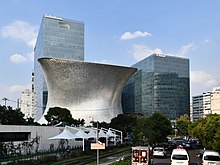Telcel
This article has multiple issues. Please help improve it or discuss these issues on the talk page. (Learn how and when to remove these template messages)
|
 | |
| Company type | Subsidiary |
|---|---|
| Industry | Telecommunications |
| Founded | 1984 (as Radio Móvil Dipsa) |
| Founder | Carlos Slim |
| Headquarters | Mexico City, Mexico |
Key people | Daniel Hajj Aboumrad[1] |
| Products | Fixed and Mobile telephony, Mobile Broadband |
| Parent | América Móvil |
| Website | www |
Radio Móvil Dipsa S.A.U., doing business as Telcel, is a Mexican wireless telecommunications company, owned by América Móvil, founded in 1984 and based in Mexico City. Telcel holds concessions to operate a wireless network in all nine geographic regions in Mexico using both the 850 megahertz and 1900 megahertz radio spectrum.
Voice services[edit]
Telcel provides services in AMPS, GSM, and TDMA, as well as the newer technologies of UMTS and WCDMA.[citation needed]
Data services[edit]
Two-way SMS was introduced by the company in January 2002, and MMS, using GSM technology (for postpaid and prepaid customers), commenced in March 2003. Since December 2004, postpaid and prepaid customers may send and receive short messages to and from users from 35 other countries.
Telcel supplies data services in GPRS, EDGE, 3G HSPA, 3.5G HSPA+, 4G LTE and 5G.[2]
Sales and distribution[edit]
Telcel markets its wireless services primarily through exclusive distributors located throughout Mexico. As of March 31, 2007, Telcel had relationships with a network of approximately 1,171 exclusive distributors, who sell Telcel's services and products through approximately 48,320 points of sale and receive commissions.
Network[edit]
3G Technology[edit]
Telcel officially launched its 3G (850MHz Band) services on February 25, 2008 initially in the cities of: Guadalajara, Hermosillo, Mérida, León, Morelia, Monterrey, Tijuana, Puebla, Santiago de Querétaro and México D.F. This was the second 3G Wireless Network, in Mexico after Iusacell's 3G Nationwide CDMA2000 network. Telcel's 3G Network expanded to other cities, to finally become a national 3G network which reaches more than 350 cities. Telcel's 3G network is based on UMTS / HSDPA / HSPA+ technology (850Mhz/Band 5).
Telcel launched its HSPA+ network in Mexico City and other major Mexican cities, by the end of 2011. By May 2012, Telcel's HSPA+ network already covered most of the cities and roads in Mexico, offering its customers speeds of up to 7.2Mbit/s.
Unlike many companies, who advertise their HSPA+ network as a "4G network," Telcel advertises its HSPA+ Network as a "3.5G network,". As it counts with a 4G LTE Network, which is the one they advertise as "4G"
4G Technology[edit]
Telcel is the second company in Latin America to promote a 4G service (under LTE Band 4/1700 MHz), but the other player in the market, Iusacell, uses simply HSPA+ instead of LTE. Telcel currently offers 4G LTE service in 9 Cities in Mexico. And by the first trimester of 2013, it is going to expand its 4G LTE service, to cover a total of 26 cities in the country. It is expected that by the end of 2013, Telcel's 4G LTE Network will become a nationwide 4G LTE Network. covering more than 80% of the population. With the addition of 4G LTE Telcel now offers a wide variety of technologies including: TDMA, GSM, GPRS, EDGE, UMTS, HSDPA, HSPA+ & LTE. These technologies are branded as: 2G (GPRS, EDGE), 3G (UMTS, HSDPA), 3.5G (HSPA+), 4G (LTE) & 4.5G (LTE-A).
References[edit]
- ^ "Directivos Telcel - Corporativo | Mundo Telcel".
- ^ Madry, Kylie (February 22, 2022). "America Movil launches 5G in Mexico, aiming to reach 120 cities this year". Reuters. Retrieved February 11, 2023.
